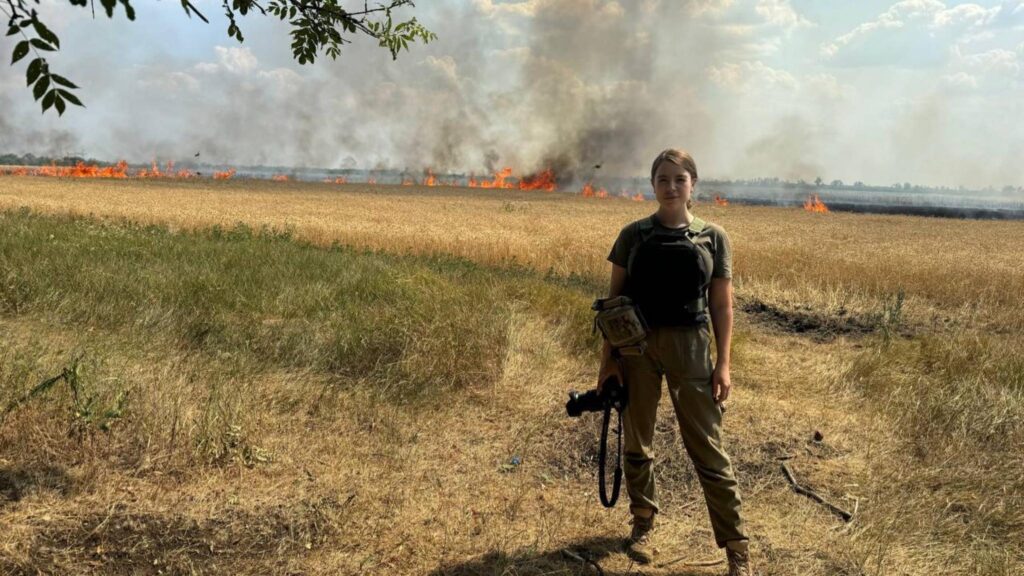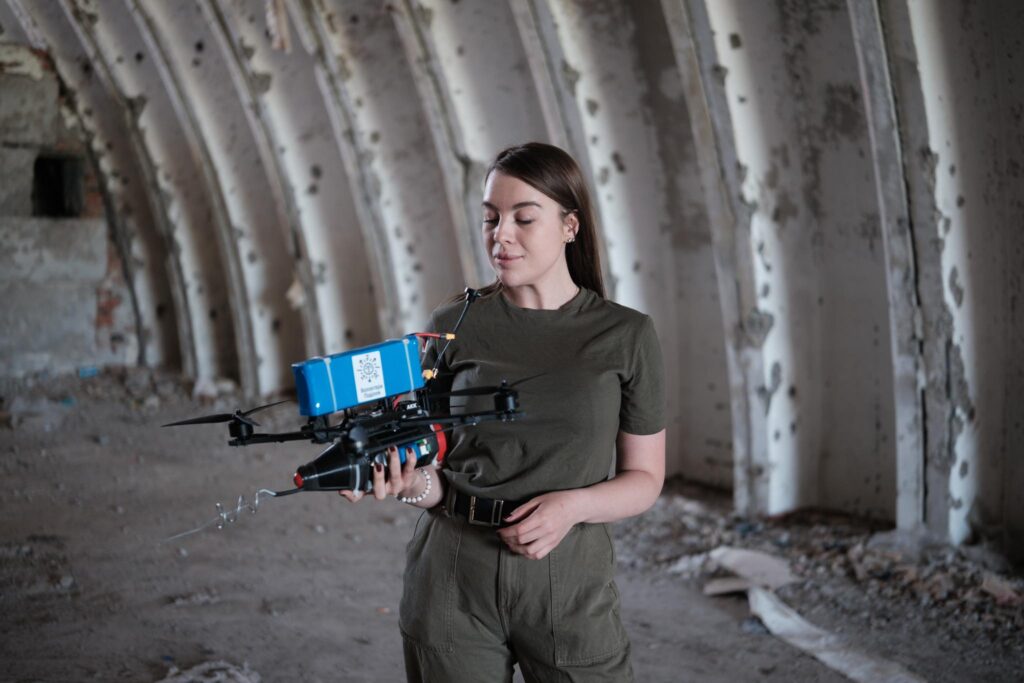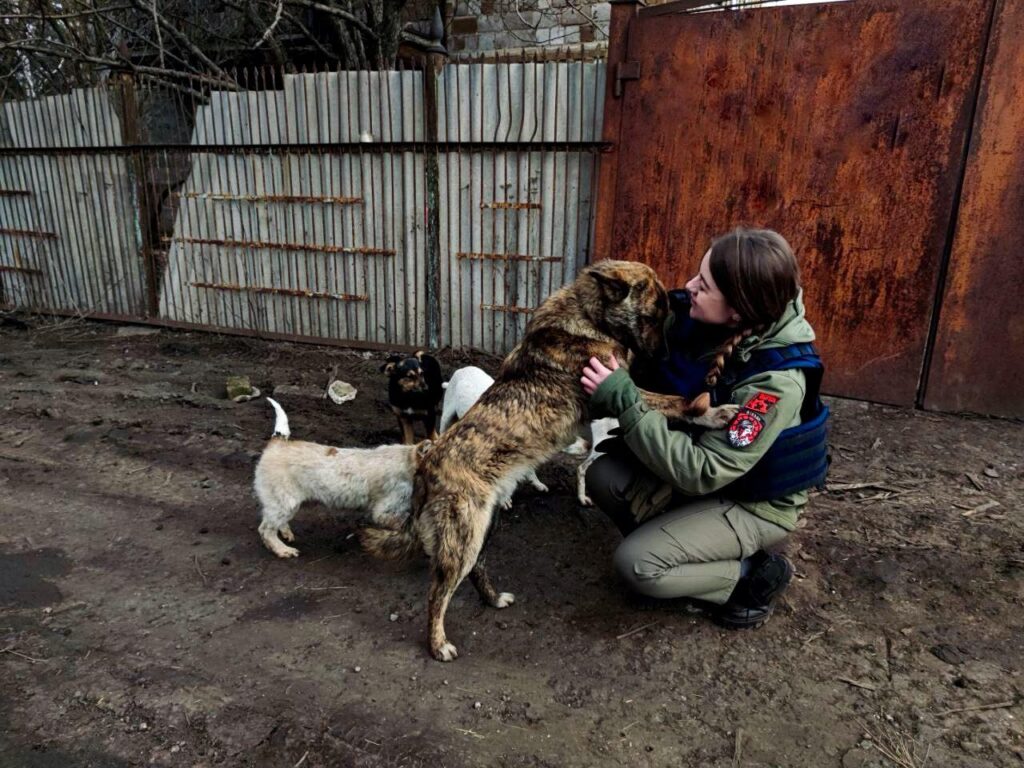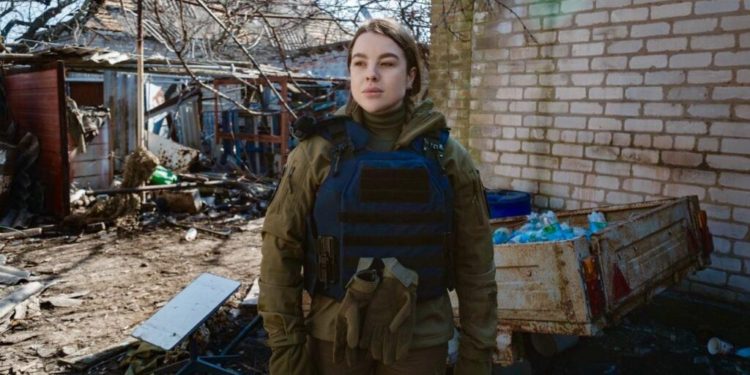Military journalism plays an important role in the present. Reports from the front are not only the living stories of fighters, but also an opportunity to open a brigade collection and cover urgent needs. RBC-Ukraine war correspondent Bohdana Liaskivska told the employees of the Unified Western Ukrainian JSC about how to prepare for departure, find a common language with the military, and adapt to new conditions.
– Bohdana, when did you decide to engage in military journalism?
– I have been working in journalism for eight years. For a long time, I was the host of a morning show and analytical programs. And when the war began, I was the host of informational, military-patriotic programs. But then I decided that I could no longer sit in a dress on the couch and host a show, so I switched to war journalism. For two years now, I have been spending almost all my time at the front with the military and filming reports from combat positions in different directions. I have traveled almost the entire front.
Of course, the war caught us all very unexpectedly. Although we thought that it might start, we believed that it would not happen. Now, each of my materials from the front also opens a meeting for this brigade. That is, I not only cover the stories of the people who are there and what they do, but this is also a large-scale meeting that covers the needs of these soldiers.

– What was the preparation for the first trips like?
– My first trip… I had prepared for a long time because it was my voluntary decision. After all, the editors did not force me to do it at all. I expressed my desire and changed my place of work. You have to understand that this is a real war, and you have to take tactical medicine courses. You have to understand how to apply a tourniquet and how to provide assistance to yourself and your loved one. Plus, of course, you can’t go to a combat zone without accreditation.
My very first accreditation was back in 2022; back then, it was very difficult and took a long time to get because there were checks at the Security Service of Ukraine (SSU). Now it can be done there in two weeks, especially if you are already an active war correspondent, then they quickly renew it for you.

– What about equipment?
– My newsroom provided me with equipment – a bulletproof vest, helmet, tourniquets, first aid kit. You must have comfortable shoes and clothes because you can run in trenches and the like; it all has to meet these standards.
On my first trip, I acted according to the Geneva Convention, which states that journalists must differ from the military – have black clothes, a large inscription PRESS, and a black helmet with the PRESS mark. And when we arrived at the military, they told us: “Well, well done, but we’re giving you our clothes because in Ukraine, due to the war with the russians, who don’t follow conventions, journalists are not recommended to stand out on the front lines.” Of course, I had to completely change my wardrobe for the trips to adapt to these conditions.
After the first trip, I realized that I needed to improve my physical fitness because a journalist goes to the front lines with the military; they almost never take you separately. And if they come in at four in the morning and then leave the next day at the same time, then you’ll be with them in a bulletproof vest for the entire period. I realized that my physical fitness was insufficient. I started working intensively on it to be able to run quickly in any conditions because there might be shelling.
– How is the organization of a trip for journalists to the front line?
– Organizing work at the front line is not so easy. First of all, you need to make a request to the command; without it you absolutely have no right to film in the combat zone; you cannot agree with some acquaintance – this is absolutely prohibited. And if you do this, your accreditation will be revoked, and you will no longer be able to go and film. Moreover, you may be held criminally liable because it is unknown whether you have shown the positions that cannot be filmed and the like.
So, you submit a request where you indicate your accreditation, passport data, dates, and what exactly you would like to film. They will tell you whether it is possible to do this, and if not, they may offer something else. Next, you must find the brigade press officer and discuss the details of the material. Every time you work in the combat zone, you must constantly ask whether it is possible to film from this angle and whether it is possible to show this trench, dugout.
– How long does it take to prepare one of the issues from the front line?
– I make large materials; usually, they are not stories, but rather reports, for 30-40 minutes. Editing takes much time, because we work on it carefully. One material can take from two weeks to a month. The time from preparing the material to its release is also affected by whether the commander has time to look at it and agree on the publication.
– How do you find a common language with the military so as not to traumatize them or ask an inappropriate question?
– I go straight to the position for a day and do not start recording right away, especially while they are laying out. It can take 3-4 hours to talk; I just start to make friends with them, ask them something, can drink coffee.
Unfortunately, there is a very big gap between the military and civilians; this is for obvious reasons. But I spend most of my time at the front, and the military realize that they can talk to me, and I will understand them. Then I get closer to them; they tell me about their families and their lives, and only after that do I start recording. They are more open and can tell me something.
I have rarely seen people really stressed; although they are very tired, most of them stay positive. Medics can be in a difficult mood because they have to see and take out the wounded every day.

And when you are on the same level, when you drink the same three-in-one coffee with them from the same tin cup, which is poured with water, you sit with them in the same basement – gradually affection appears. Of course, there is a moment when the camera turns on, and they “get stuck” because they can be more worried about the camera than the person himself
– What is the most difficult thing for you on such trips?
– There are different situations. But nothing is difficult; I am used to it. It is difficult for me in the winter because I do not easily tolerate the cold, and it is difficult when you sit in a dugout for a day. Sometimes, it is bad without sleep when there is no opportunity to sleep, and you feel like a vegetable.
It is also very difficult for me because many of the people I filmed are no longer alive. The presidium officer writes, can I dump the raw material to give it to the family… There are a lot of such cases, unfortunately.
Many soldiers are in despair because they do not understand why people are still sitting there. It is really very difficult for them; they are just doing some kind of miracle there. They have no opportunity to rest, and you understand that the future depends on these people in positions, and you can’t help them in any way except for the meetings.
I put meaning into each of my reports – to change society’s understanding of what is happening now. Suppose I convey to at least one person through my story that something needs to be done so that we can at least stabilize the situation. In that case, I will continue to make materials. The army needs much help. You look them in the eye – you want to do as much as possible, and sometimes it’s a shame for society. The military wants answers, and I don’t have them.
Call the Unified Western Ukrainian JSC Lviv-Chernivtsi at 097 907 9702 (Nataliya Voitovych, the coordinator of the Lviv’s Center, and Volodymyr Bober, assistant). The Center’s address is 5 Solomiyi Krushelnytskoyi Street.
ABOUT JSC
The Journalists’ Solidarity Centers is an initiative of the NUJU implemented with the support of the International and European Federations of Journalists and UNESCO. The initiative is designated to help media representatives working in Ukraine during the war. The Centers operate in Kyiv, Lviv, Ivano-Frankivsk, Chernivtsi, Zaporizhzhia, and Dnipro and provide journalists with organizational, technical, legal, psychological, and other types of assistance.
ABOUT UNESCO
UNESCO is the United Nations Educational, Scientific, and Cultural Organization. It contributes to peace and security by promoting international cooperation in education, sciences, culture, communication, and information. UNESCO promotes knowledge sharing and the free flow of ideas to accelerate mutual understanding. It is the coordinator of the UN Action Plan on the Safety of Journalists and the Issue of Impunity, which aims to create a free and safe environment for journalists and media workers, thus strengthening peace, democracy, and sustainable development worldwide. UNESCO is working closely with its partner organizations in Ukraine to provide support to journalists on the ground.
The designations employed and the presentation of material throughout this digest do not imply the expression of any opinion whatsoever on the part of UNESCO concerning the legal status of any country, territory, city, or area or its authorities or concerning the delimitation of its frontiers or boundaries.
The authors are responsible for the choice and the presentation of the facts contained in this digest and for the opinions expressed therein, which are not necessarily those of UNESCO and do not commit to the organization.
Dariya Markova

 THE NATIONAL UNION OF
JOURNALISTS OF UKRAINE
THE NATIONAL UNION OF
JOURNALISTS OF UKRAINE
















Discussion about this post